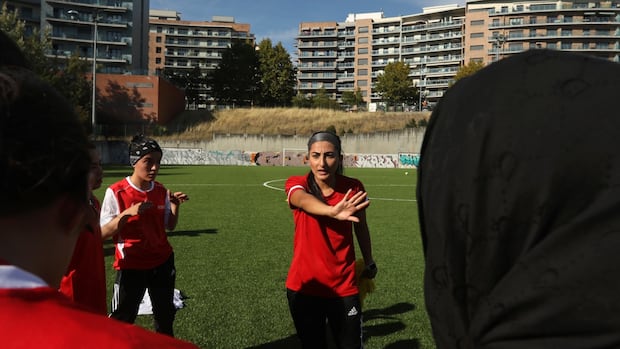Mother’s Day was celebrated by Canadian soccer through a variety of events and activities at NSL matches this weekend. Not only recognizing the impact that women make on the pitch but off it and in wider society. It was also a nod to all women working in soccer and the ways in which we belong.
Calgary Wild’s Sonia O’Neil had a tiny locker setup for her daughter beside hers in their locker room at the home opener.
I attended the AFC Toronto versus Vancouver Rise match in Toronto and even took my daughter (with permission of the club) because it was Mother’s Day. It was not the first time one of my children has been beside me while I’m working, but to be covering a professional women’s match and have her there was amazing.
The league offering this kind of support sets an important precedent. In a previous interview with NSL president Christina Litz, she told me that this league embraces babies or pets at meetings. They understand and appreciate the many roles that women might have.
The inclusion of women in global soccer should not be a polarizing or divisive issue. But O’Neill’s Calgary Wild teammate, Farkhunda Muhtaj, has a different experience.
Muhtaj, the Wild’s first signing, is also the captain of the Afghanistan senior women’s national team. When the Taliban took over in 2021, all activity stopped. With control of the Afghanistan Football Federation, the Taliban banned girls and women from sports. The situation was dire. Muhtaj helped evacuate more than 80 people, including members of the junior national squad. Since then, Muhtaj has been engaged in many conversations focused on how to safely and sustainably restart the national program.
Khalida Popal, the team’s founder, fled Afghanistan in 2011. Since then she has organized and managed the team from Denmark, where she now lives. She also assisted in hundreds of evacuations of Afghans. She wrote a book about the harrowing experiences of her teammates and their families.
Popal has been lobbying FIFA to formally recognize the team (the players live abroad) so they can play in World Cup qualifiers and in tournaments in the Asian confederation. The players have already lost out on years of eligibility and activity due to a lack of action by FIFA.
“It has been more than three years that I’ve been sending emails with the support of different organizations, to get [a] response from FIFA, to get FIFA on board, to collaborate with us,” Popal told CBC radio’s As It Happens.
Last week, in the same meeting that FIFA voted to expand the Women’s World Cup tournament to 48 teams in 2031, FIFA finally recognized the Afghan women’s national team, but only as a refugee team. This means that they can only play friendlies. It’s considered by some to be partial recognition.
“This is a temporary solution and is not ideal, but it’s an important start,” Muhtaj told me over text message. “Reinstating the official Afghanistan women’s national team will take time, and it’s important we remain respectful of how this affects the safety of others and patient as FIFA navigates how best to support Afghan women under complex and challenging circumstances.”
It’s a sharp contrast to see women being lauded and elevated in Canada as global women’s soccer continues to reach new heights, while Afghan soccer players at home and abroad don’t have the luxury of fully participating.
Since the Taliban regime took over, sports for girls have been eliminated in Kabul, a city that once boasted successful programs like Skateistan, and had a league for women’s soccer and cricket teams.
Ahead of the Paris 2024 Olympics, there was an outcry from some Afghans for the International Olympic Committee to ban Taliban-controlled Afghanistan from the Olympics because of gender apartheid.
WATCH | Farkhunda Muhtaj and her powerful journey through Ramadan and sport:
Ramadan is a powerful month for Muslims around the world. Farkhunda Muhtaj, an NSL player for Calgary Wild FC, observes the holiday with a fervor that matches her love of sport.
This latest effort seems to be addressing the issue without offering a real solution. Yes, the situation is complex and FIFA actually requires the AFF to have the women’s team participate at a full level.
But giving a misogynist regime the choice to let women and girls play is absolutely opposite to what the spirit of the beautiful game is supposed to be. And does that even align with FIFA’s own mandates on gender equity? Short answer: no.
Allowing women to compete in a particular and restricted set of circumstances doesn’t ring of liberation and freedom of play. In fact, it seems like the proposal isn’t on target. To use soccer vernacular: the shot is going wide.
There isn’t a way to get back the time that women and girls have lost from sports and activity. But as the rest of the world moves forward at lightning speed, embracing mothers as players, officials, media members and team executives and staff, the distance between us and Afghan women will increase — and perhaps will become insurmountable.
As I, and many women, feel the joy and excitement and hope for the future of girls’ and women’s soccer in Canada and beyond, I can’t help but be so deeply discouraged by FIFA. They, along with other governing bodies, have not figured out how exactly to navigate this situation and create a space that let’s women not only exist, but thrive in sport.
“I’m grateful that FIFA has been listening to us,” Muhtaj said. “And is approaching this process with cultural sensitivity, geopolitical awareness, and a genuine effort for us to return to the pitch.”
A return to the pitch is urgent indeed. Before we lose another generation of girls to this madness.

